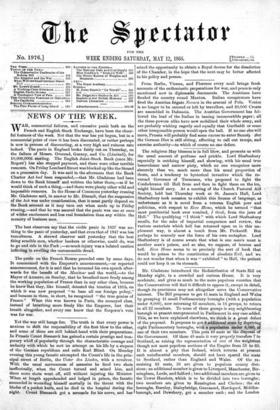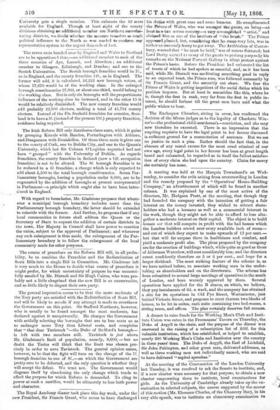Mr. Gladstone introduced the Redistribution of Seats Bill on Monday
night, in a crowded and curious House. It is very moderate, and gives so much to the more populous counties that the Conservatives will find it difficult to oppose it, except in detail, though its provisions may not altogether serve the Conservative interest. The Bill proposes to get 41 seats in England and Wales by grouping 41 small Parliamentary boroughs (with a population under 8,000), now returning 63 members, in 16 groups, to return in all 22 members. To none of these groups is auy. neighbouring borough at present unrepresented in Parliament in any case added. This, as we have explained elsewhere, we think is a great defect of the proposal. It proposes to get 8 additional seats by depriving eight Parliamentary boroughs, with a population under 8,000, of one of their two members. This puts 49 seats at the disposal of the Government. Of these 49 seats it very properly transfers 7 to Scotland, so raising the representation of one of the weightiest though not most populous sections of the Empire from 53 to 60. It is almost a pity that Ireland, which returns at present such uninfluential members, should not have spared the seats to Scotland, rather than England and Wales. Of the re- maining 42 seats, 26 are given to populous county divi- sions; an additional member is given to Liverpool, Manchester, Bir- mingham, Leeds, and Salford ; two additional members are given to the Tower Hamlets, which is to be divided into two boroughs; two members are given to Kensington and Chelsea ; the six boroughs, Burnley, Staleybridge, Gravesend, Hartlepool, Middles- borough, and Dewsbury, get a member each ; and the London
University gets a single member. This exhausts the 42 seats available for England. Though at least eight of the county divisions obtaining an additional member are Nertherat anenufaa-, turing districts, we doubt whether the measure transfers as much political influence to the North as was needed to conform eter representative system to the urgent demands of fact.































 Previous page
Previous page